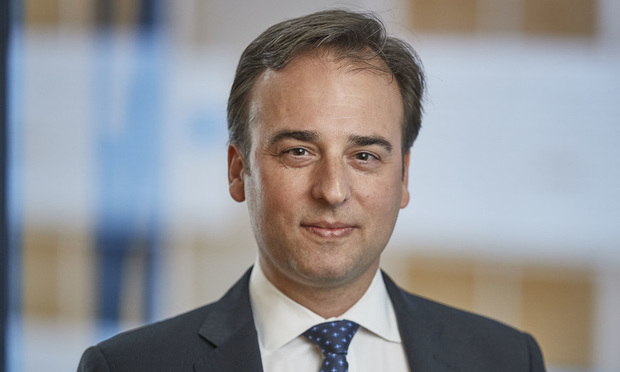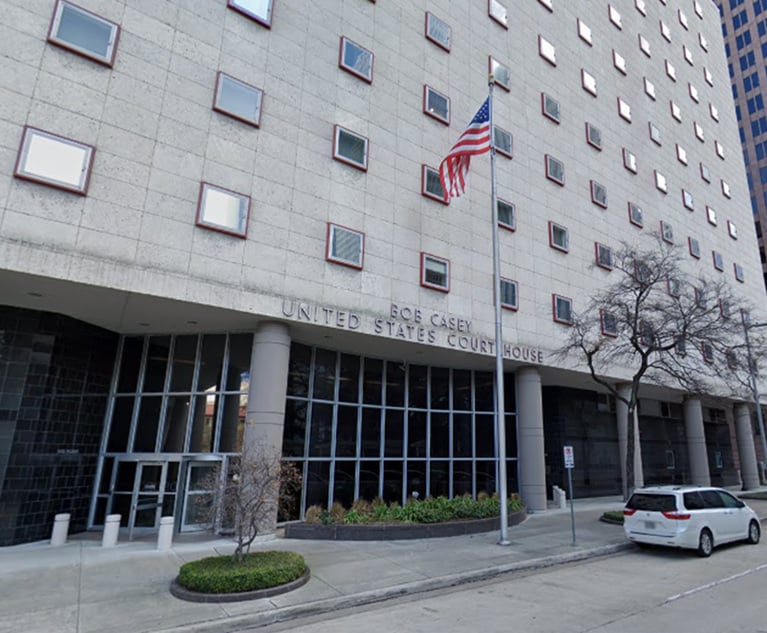Old School: David Pressman Brings Diplomacy to Boies Schiller Flexner
No longer in government, the litigator-turned-ambassador and back again is still focused on matters of state.
May 28, 2019 at 03:41 PM
7 minute read
 David Pressman of Boies Schiller Flexner/courtesy photo
David Pressman of Boies Schiller Flexner/courtesy photo
As a diplomat, national security official and negotiator in the Obama era, David Pressman ping-ponged from international crisis to international crisis.
As a New York partner with Boies Schiller Flexner, a firm best known for hard-nosed U.S. litigation, his job description hasn't changed all that much.
Nearly three years after joining Boies Schiller, Pressman's docket—amid heightened U.S. tensions with both China and Russia—includes targeting Russian banks over the downing of a Malaysian passenger plane in Ukraine and fighting to bring detained U.S. citizens home from China. And those are just the cases Pressman and his firm are willing to acknowledge.
Alongside his work at Boies Schiller, which the firm says includes counseling clients on U.S. sanctions and foreign investment regimes, Pressman, 42, is simultaneously serving as executive director of the Clooney Foundation for Justice, working with George and Amal Clooney to spotlight alleged human rights violators overseas. It's an advocacy streak that can be traced back to his early career work with New York civil rights lawyer and William Kunstler protégé Ron Kuby.
Pressman's specialty, in part, is not being too specialized. He said his practice is about helping “large, global clients with complicated issues.” He has the right resume, including an ambassador title from his days representing the U.S. before the United Nations Security Council. He was the White House National Security Council director for war crimes and atrocities, and he oversaw cybersecurity, foreign investment and export controls as policy chief at the Department of Homeland Security.
“I bring to my clients not only an ability to litigate and arbitrate, but the ability to negotiate with foreign governments,” Pressman said. “I wanted a place that would allow me to craft a practice that is unique to my background. And there was enthusiasm about doing that at Boies Schiller.”
It's a practice that Pressman's colleagues in both government and Big Law describe as a throwback—in a good way.
“In the legal profession, there was once an ideal of a 'lawyer-statesman,' a lawyer who brought values, judgment, wisdom, and pragmatism to big problems for clients and for our world,” said Janet Napolitano, who was Pressman's boss at Homeland Security.
The notion of “lawyer-statesmen” is a recurring one in academic legal circles, referring to some combination of legal erudition, practical wisdom and a melding of client service with a dedication to the public good.
But is such an ideal compatible with the business needs of a modern law firm?
In Pressman's case at least, Boies Schiller name partner Jonathan Schiller suggests that it is.
“He is our statesman-litigator, an elegant person and a pleasure to work with” Schiller said. And he describes Pressman's value as far from academic. “He advises clients on navigating political and legal issues in cross-border deals, disputes with foreign governments, national security-related issues and public law disputes,” Schiller said.
In two of Pressman's current matters, the need for a lawyer able to navigate complex international issues couldn't be clearer.
In a federal lawsuit filed in Manhattan last month, Pressman is representing the family of Quinn Lucas Schansman, the lone American on the Malaysian passenger airliner that was shot down by a surface-to-air missile over Ukraine in 2014. The complaint aims to hold Russian banks VTB Bank and Sberbank of Russia and U.S.-based money transfer companies Western Union and MoneyGram liable under the U.S. Antiterrorism Act, alleging they provided support to the Moscow-backed separatists whom the suit blames for the attack.
The case is bound to be hard-fought—Paul Weiss Rifkind Wharton & Garrison and Williams & Connolly have entered appearances for Western Union and MoneyGram, respectively, but Pressman is confident in the approach.
“The whole point of the Antiterrorism Act is to tackle the full supply chain of terror,” he said. “When I was at DHS, we learned the hard way over time that there is a supply chain that feeds trouble. That feeds terrorism. The Antiterrorism Act was specifically crafted to include this concept of providing material support. I think this litigation is emblematic of the kind of national security work that I am interested in doing on behalf of clients.”
Columbia Law School's Sarah Cleveland, a legal adviser to the State Department during Pressman's tenure as ambassador, noted that the kind of practice he's developed requires equal dexterity outside the courtroom. “You can't just rely on a legal strategy,” she said. “You need political engagement.”
Normally, Cleveland said, the government's official diplomatic machinery is engaged in many of the issues that Pressman's practice is tackling. But changing power dynamics, a more global world with fewer boundaries and the deterioration of U.S. diplomatic credibility abroad has made a practice such as Pressman's more necessary than ever, she said.
Necessary, for example, in the case of Pressman's clients Victor and Cynthia Liu.
In June 2018, Victor, 19, and Cynthia Liu, 27, went to China with their mother to visit a dying relative. Within days of arriving their mother, Sandra Han, was arrested and taken to an undisclosed location. When the children attempted to leave the country, they were told by Chinese authorities that they couldn't, even though they had not been charged with a crime. Both are U.S. citizens, and Victor was born in the U.S. The children's father, Liu-Changming, whose whereabouts are currently unknown, is wanted in China to face charges stemming from an alleged $1.4 billion bank fraud.
Representatives for the children have made pleas to the State Department and to elected officials in Massachusetts, but have been unable to secure their release. National Security Adviser John Bolton also pressed for their release last year to no avail.
Pressman said he couldn't comment on the details of any negotiations related to the detentions, which are playing out as the U.S. and China continue to butt heads on trade.
For a lawyer-statesman or any lawyer, it's a situation that calls for the mix of international experience and focused legal strategy that has become Pressman's stock in trade. Just ask Samantha Power, who worked alongside him when she was ambassador to the United Nations and who later turned to him for counsel when she was subpoenaed as part of the investigation into Russian interference in the 2016 U.S. presidential election.
“I learned an expression when I was at the White House–GSD. This stands for get shit done,” Power said. “I am not sure I've met anybody who combines [his] irrepressible ambition to get shit done with the bureaucratic chops and creativity to actually do it.”
Read More
Sweeping Trump Probe Spells Busy Times for These Big Law Partners
This content has been archived. It is available through our partners, LexisNexis® and Bloomberg Law.
To view this content, please continue to their sites.
Not a Lexis Subscriber?
Subscribe Now
Not a Bloomberg Law Subscriber?
Subscribe Now
NOT FOR REPRINT
© 2025 ALM Global, LLC, All Rights Reserved. Request academic re-use from www.copyright.com. All other uses, submit a request to [email protected]. For more information visit Asset & Logo Licensing.
You Might Like
View All
Law Firms Expand Scope of Immigration Expertise Amid Blitz of Trump Orders
6 minute read
Am Law 100 Lateral Partner Hiring Rose in 2024: Report

KPMG's Bid to Practice Law in U.S. on Indefinite Hold, as Arizona Justices Exercise Caution

JCPenney Seeks Return of More Than $1.1M From Jackson Walker For Bankruptcy Work
3 minute readTrending Stories
- 1Uber Files RICO Suit Against Plaintiff-Side Firms Alleging Fraudulent Injury Claims
- 2The Law Firm Disrupted: Scrutinizing the Elephant More Than the Mouse
- 3Inherent Diminished Value Damages Unavailable to 3rd-Party Claimants, Court Says
- 4Pa. Defense Firm Sued by Client Over Ex-Eagles Player's $43.5M Med Mal Win
- 5Losses Mount at Morris Manning, but Departing Ex-Chair Stays Bullish About His Old Firm's Future
Who Got The Work
J. Brugh Lower of Gibbons has entered an appearance for industrial equipment supplier Devco Corporation in a pending trademark infringement lawsuit. The suit, accusing the defendant of selling knock-off Graco products, was filed Dec. 18 in New Jersey District Court by Rivkin Radler on behalf of Graco Inc. and Graco Minnesota. The case, assigned to U.S. District Judge Zahid N. Quraishi, is 3:24-cv-11294, Graco Inc. et al v. Devco Corporation.
Who Got The Work
Rebecca Maller-Stein and Kent A. Yalowitz of Arnold & Porter Kaye Scholer have entered their appearances for Hanaco Venture Capital and its executives, Lior Prosor and David Frankel, in a pending securities lawsuit. The action, filed on Dec. 24 in New York Southern District Court by Zell, Aron & Co. on behalf of Goldeneye Advisors, accuses the defendants of negligently and fraudulently managing the plaintiff's $1 million investment. The case, assigned to U.S. District Judge Vernon S. Broderick, is 1:24-cv-09918, Goldeneye Advisors, LLC v. Hanaco Venture Capital, Ltd. et al.
Who Got The Work
Attorneys from A&O Shearman has stepped in as defense counsel for Toronto-Dominion Bank and other defendants in a pending securities class action. The suit, filed Dec. 11 in New York Southern District Court by Bleichmar Fonti & Auld, accuses the defendants of concealing the bank's 'pervasive' deficiencies in regards to its compliance with the Bank Secrecy Act and the quality of its anti-money laundering controls. The case, assigned to U.S. District Judge Arun Subramanian, is 1:24-cv-09445, Gonzalez v. The Toronto-Dominion Bank et al.
Who Got The Work
Crown Castle International, a Pennsylvania company providing shared communications infrastructure, has turned to Luke D. Wolf of Gordon Rees Scully Mansukhani to fend off a pending breach-of-contract lawsuit. The court action, filed Nov. 25 in Michigan Eastern District Court by Hooper Hathaway PC on behalf of The Town Residences LLC, accuses Crown Castle of failing to transfer approximately $30,000 in utility payments from T-Mobile in breach of a roof-top lease and assignment agreement. The case, assigned to U.S. District Judge Susan K. Declercq, is 2:24-cv-13131, The Town Residences LLC v. T-Mobile US, Inc. et al.
Who Got The Work
Wilfred P. Coronato and Daniel M. Schwartz of McCarter & English have stepped in as defense counsel to Electrolux Home Products Inc. in a pending product liability lawsuit. The court action, filed Nov. 26 in New York Eastern District Court by Poulos Lopiccolo PC and Nagel Rice LLP on behalf of David Stern, alleges that the defendant's refrigerators’ drawers and shelving repeatedly break and fall apart within months after purchase. The case, assigned to U.S. District Judge Joan M. Azrack, is 2:24-cv-08204, Stern v. Electrolux Home Products, Inc.
Featured Firms
Law Offices of Gary Martin Hays & Associates, P.C.
(470) 294-1674
Law Offices of Mark E. Salomone
(857) 444-6468
Smith & Hassler
(713) 739-1250










